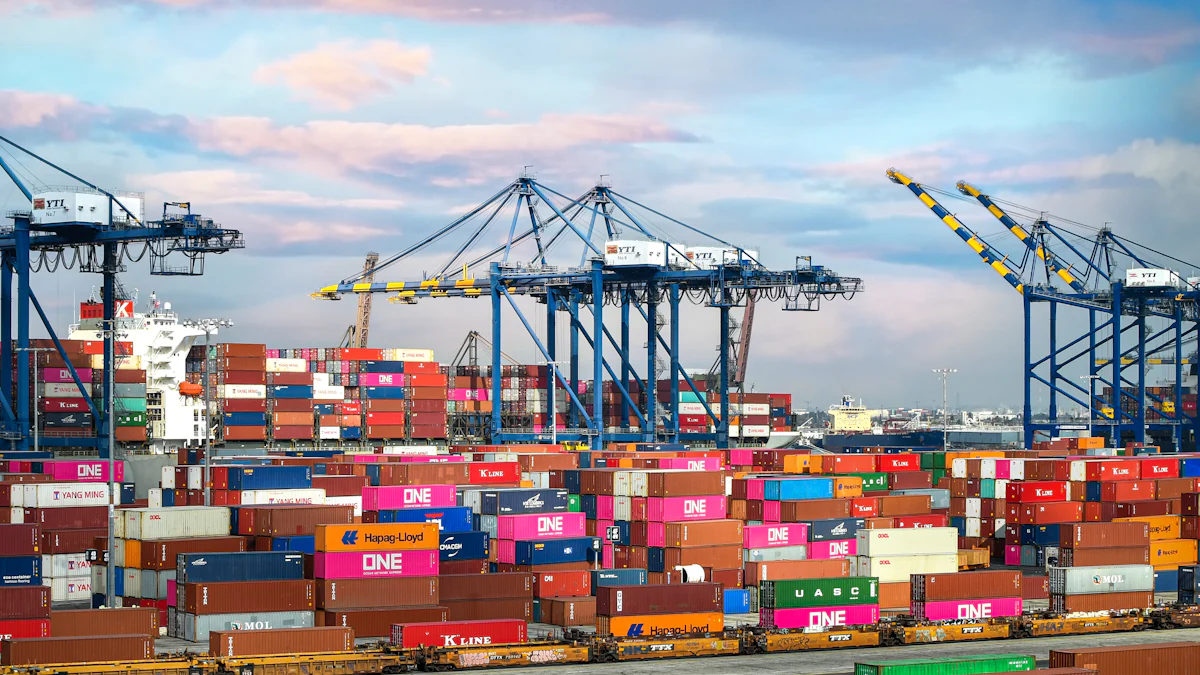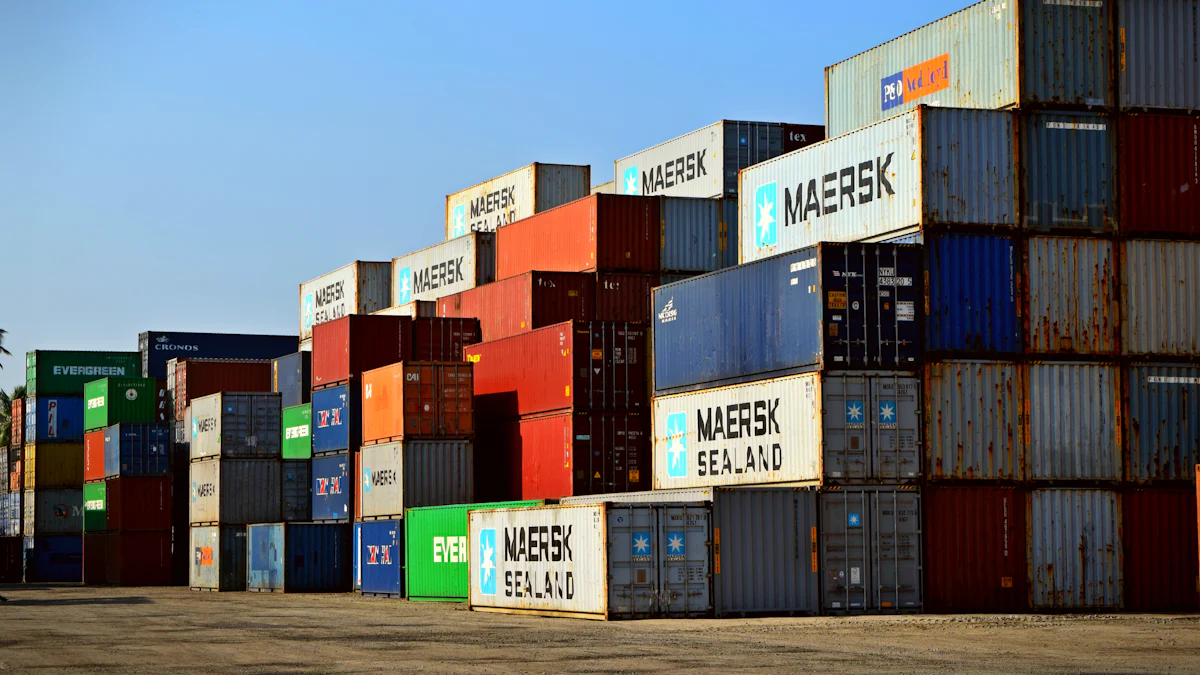Borderless Commerce, Boundless Opportunities: Mastering Cross-border E-commerce Logistics Solutions with JUSDA

Welcome to the realm of cross-border e-commerce, where opportunities transcend borders and commerce knows no bounds. In today's global market, the concept of borderless commerce has revolutionized how businesses connect with consumers worldwide. Embracing this dynamic landscape is essential for growth and expansion. Enter JUSDA, a creative player in streamlining cross-border e-commerce logistics. With JUSDA's expertise, navigating the complexities of international trade becomes seamless, opening doors to a world of possibilities for businesses seeking global reach.
Understanding Cross-border E-commerce Logistics

Definition and Importance
What is Cross-border E-commerce Logistics?
Cross-border e-commerce logistics involves the efficient management and movement of goods across international borders to fulfill customer orders. It encompasses a range of activities from order processing to final delivery, ensuring seamless transactions between businesses and consumers globally.
Why is it crucial for global trade?
Cross-border e-commerce logistics plays a pivotal role in expanding market reach, fostering international trade relationships, and meeting the demands of a global customer base. By optimizing logistics processes, businesses can enhance their competitiveness, improve customer satisfaction, and capitalize on the boundless opportunities presented by cross-border commerce.
Key Components
Transportation and Shipping
Efficient transportation and shipping are fundamental aspects of cross-border e-commerce logistics. Utilizing reliable carriers and establishing strategic shipping routes are essential for timely deliveries and cost-effective operations.
Customs and Compliance
Navigating customs regulations and ensuring compliance with international trade laws are critical components of cross-border e-commerce logistics. Proper documentation, tariff classification, and adherence to import/export regulations are imperative for smooth cross-border transactions.
Warehousing and Inventory Management
Effective warehousing and inventory management are key to optimizing cross-border e-commerce logistics. Maintaining accurate inventory levels, implementing robust storage solutions, and streamlining order fulfillment processes contribute to operational efficiency and customer satisfaction.
Challenges in Cross-border E-commerce Logistics
Regulatory and Compliance Issues
Dealing with diverse regulatory frameworks, varying tax structures, and complex compliance requirements pose significant challenges in cross-border e-commerce logistics. Businesses must stay informed about changing regulations to ensure seamless operations across different markets.
Shipping Costs and Delivery Times
Managing shipping costs while maintaining competitive delivery times presents a constant challenge in cross-border e-commerce logistics. Balancing cost-efficiency with expedited shipping options is crucial for meeting customer expectations without compromising profitability.
Currency and Payment Processing
Navigating multiple currencies, fluctuating exchange rates, and diverse payment methods can complicate cross-border e-commerce transactions. Implementing secure payment gateways, offering currency conversion options, and providing transparent pricing mechanisms are essential for facilitating smooth payment processing across borders.
Solutions for Efficient Cross-border E-commerce Logistics
Partnering with Experts
Role of JUSDA in Cross-border Logistics
Partnering with JUSDA opens the gateway to seamless cross-border logistics solutions. With their expertise in navigating international trade complexities, JUSDA serves as a strategic ally in optimizing supply chain operations. By leveraging JUSDA's extensive network and industry knowledge, businesses can enhance their logistical efficiency and expand their global reach.
Case Studies of Successful Partnerships
Examining real-world collaborations showcases the tangible benefits of partnering with logistics experts like JUSDA. These case studies highlight how businesses have overcome logistical challenges, streamlined operations, and achieved significant growth by entrusting their cross-border e-commerce logistics to experienced professionals.
Who's JUSDASR
It's key offerings for Cross-border E-commerce
JUSDASR, the brainchild of JUSDA, stands at the forefront of cross-border new retail supply chain solutions. Tailored specifically for merchants and manufacturers, JUSDASR's innovative services empower businesses to navigate the complexities of international trade seamlessly. By embracing cutting-edge technologies and a client-centric approach, JUSDASR redefines cross-border e-commerce logistics excellence.
Regarding overseas warehouse services, JUSDASR facilitates the bulk shipment of goods by air or sea to its cross-border warehouses. Upon arrival, products are promptly inventoried within 24 hours and can be readied for shipment in as few as eight hours. The overseas warehouses cater to a multitude of scenarios:
Individual order fulfillment for C-end consumers, with picking and packing conducted before dispatch via local carriers.
Bulk cargo transshipment, entailing deconsolidation and subsequent distribution to various e-commerce platforms' official warehouses, including Amazon FBA and Walmart WFS.
B2B order management, where packaging is customized or palletized according to factory or brand B2B orders, then shipped to buyers or physical retail locations.
Comprehensive Head-haul Services for Cross-border E-commerce
One of JUSDASR's flagship services is its Small Parcel Direct offering, designed to expedite individual package shipments from China to global destinations. Leveraging dedicated air routes and local courier networks, this service ensures swift deliveries within days.
Additionally, JUSDASR's overseas warehouses streamline bulk cargo handling, enabling rapid inventory management and efficient order fulfillment across diverse scenarios. This door-to-door solution encompasses customs clearance and delivery to specified foreign addresses. Through direct agreements with premier airlines and shipping lines, JUSDASR guarantees substantial transportation capacity and a range of routing alternatives for clients. Additionally, by utilizing its own discounted last-mile delivery arrangements, the company delivers efficient services at reduced costs.
Best Practices
Streamlining Customs Procedures
Efficiently navigating customs regulations is paramount in cross-border e-commerce logistics. By implementing streamlined customs procedures and ensuring compliance with international trade laws, businesses can minimize delays, reduce costs, and enhance overall operational efficiency.
Optimizing Shipping Routes
Optimizing shipping routes plays a crucial role in enhancing delivery times and cost-effectiveness in cross-border e-commerce logistics. By strategically selecting transportation modes and routes based on market demands and operational requirements, businesses can achieve faster deliveries and improved customer satisfaction.
Effective Inventory Management
Effective inventory management lies at the core of successful cross-border e-commerce logistics. Maintaining accurate stock levels, implementing robust storage solutions, and optimizing order fulfillment processes are essential practices that contribute to operational efficiency and customer-centric service delivery.
Future Trends in Cross-border E-commerce Supply Chain

Emerging Technologies
AI and Machine Learning
In the realm of cross-border e-commerce, AI and Machine Learning are revolutionizing supply chain operations. These technologies empower businesses to enhance transparency, visibility, and product traceability. By leveraging AI-ML applications, companies can make smarter decisions, optimize logistics processes, and improve overall efficiency in global trade.
Blockchain for Transparency
The integration of Blockchain technology in cross-border e-commerce supply chains ensures trust, security, and transparency. Blockchain enhances data integrity, facilitates secure transactions, and strengthens collaboration among stakeholders. By embracing blockchain solutions, businesses can streamline operations, mitigate risks, and build resilient supply chains for the future.
Sustainability in Logistics
Eco-friendly Packaging
Sustainability is a driving force in modern logistics practices. Embracing eco-friendly packaging solutions reduces environmental impact, minimizes waste generation, and aligns with consumer preferences for sustainable products. By adopting recyclable materials and eco-conscious packaging designs, businesses can demonstrate their commitment to environmental stewardship while meeting customer expectations.
Green Transportation Solutions
Green transportation solutions play a vital role in promoting sustainability across cross-border e-commerce supply chains. Implementing green transportation practices such as electric vehicles, alternative fuels, and optimized route planning reduces carbon emissions, lowers operational costs, and contributes to a greener future. By prioritizing environmentally friendly transport options, businesses can achieve operational efficiency while reducing their ecological footprint.
Market Expansion Strategies
Entering New Markets
Expanding into new markets is a strategic imperative for businesses seeking growth opportunities in cross-border e-commerce. By entering new markets, companies can tap into diverse consumer segments, explore untapped regions, and diversify their revenue streams. Understanding local market dynamics, consumer behaviors, and regulatory frameworks is essential for successful market entry strategies that drive business expansion.
Adapting to Local Preferences
Adapting to local preferences is key to establishing a strong presence in international markets. Tailoring products, services,and marketing strategies to local preferences, cultural nuances,and consumer trends fosters customer engagement,loyalty,and brand resonance globally. By incorporating localization efforts into cross-border e-commerce strategies,businesses can create personalized experiences that resonate with diverse audiences worldwide.
Mastering cross-border e-commerce logistics is the key to unlocking global opportunities.
JUSDA's expertise in overcoming logistics challenges propels businesses towards success.
The future of borderless commerce holds infinite prospects for those daring to venture.
See Also
Discovering Triumph in International Trade with JUSDA
Revolutionary Approaches: Partner Connections in Global E-commerce Revealed
JUSDA: Guiding You to Achieve Supply Chain Resilience
Optimizing Productivity: JUSDA's Comprehensive Supply Chain Transparency
The Impact of JUSDA on Supply Chain Environmental Responsibility
